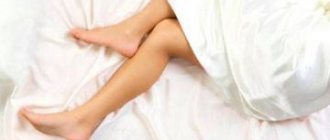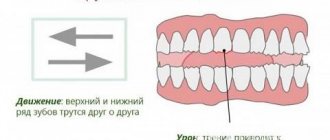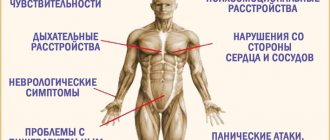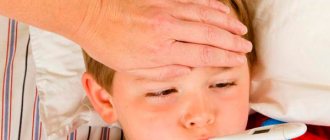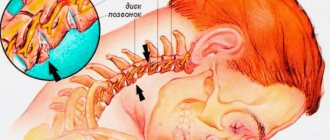Any person can periodically contract their muscles on their own. This phenomenon is called hyperkinesis and does not threaten health. But, despite this, a nervous tic is considered a kind of hint that there is a malfunction in one of the body’s systems. This cannot be treated with disdain.
Many people are interested in why only the eye twitches during a nervous tic. This is explained by the fact that the facial nerves, the endings of which are located on the face, are most vulnerable in the eyeball. And during a tick they are the very first to contract. The effect of treating this problem depends on the correct diagnosis. Experts say that the first step is to examine the nerves for any disorders or pathologies that cause eye tics.
At what age can a nervous tic occur?
The disease makes itself felt at any age. In an adult, it is associated with improper functioning of the nervous system, stress, constant fatigue and excessive emotionality. If you can understand where neurosis comes from, then you can really overcome the problem on your own. But doctors advise not to ignore the symptoms, because only a full examination will help determine the true cause of this unpleasant phenomenon.
Children may experience frequent blinking and tics in the cheeks or corners of the mouth. Sometimes the eyebrows spontaneously rise, the shoulders or the whole body tremble. But, more often than not, eye tic appears.
About 11% of girls and 15% of boys suffer from such diseases. If you believe the statistics, then it is the problem with the eye muscles that is quite common in children from 1.5 years to 17 years. The disease is especially acute at 3 years and from 7 to 11 years.
Symptoms vary depending on weather conditions, day or night, emotions experienced, character and type of activity of the child. If your baby used to blink frequently, but now jerks his shoulders, this indicates that a relapse has occurred.
Monitor your child closely during periods of low physical activity: watching TV, playing on the computer, or reading a book. If you notice a nervous tic, then immediately focus your child’s attention on something else and distract him.
how to get rid of stuttering at home
Eye twitching - reasons
Eye tic can be primary or secondary. The latter is associated with disorders of brain activity. Primary is observed in most cases in children under seven years of age and lasts a long time. It can be caused by stress, chronic tonsillitis, severe fears and psychological trauma. It is also impossible to simply answer the question of why the eye twitches during a secondary nervous tic. This problem is caused by allergies, diseases of various systems and organs, nervous strain and many other factors.
Why does the eye twitch - the upper eyelid?
An annoying and intrusive eyelid twitch occurs when overexcited neutrons send what is called an unauthorized impulse to the brain. As a rule, the upper one reacts more often than the lower one. This is due to the presence of more nerve endings. In some cases, the tic is imperceptibly weak, in others it causes nervous breakdowns, insomnia, and depression.
Below are the most common reasons why the upper eyelid twitches:
- eye diseases that cause you to blink frequently (dry eye, blepharitis, chalazion);
- smoking;
- alcohol abuse;
- excessive consumption of strong tea (the drink has a stimulating effect on the nervous system);
- professional activities related to the observation of fast moving objects (car drivers, machinists, for example);
- poor quality lenses;
- weakened immunity;
- autism;
- schizophrenia;
- diabetes;
- brain tumors;
- birth injuries;
- chronic fatigue;
- regular emotional or mental stress;
- vegetative-vascular dystonia.
Why does the lower eyelid twitch?
Sometimes a nervous tic develops against the background of Tourette's disease. In addition to this disease, the reasons why the lower eyelid twitches include the following factors:
- bacterial lesions;
- abuse of certain medications;
- allergy;
- viruses;
- unfavorable environmental conditions;
- avitaminosis;
- disruption of the transmission of nerve impulses to the eye muscles;
- postpartum weakness and others.
If the lower eyelid twitches too often in the same eye, this may indicate:
- tumor growth;
- initial stage of cerebral infarction;
- post-stroke condition.
Causes of nervous tics
Although the main cause is considered to be problems with nerves, doctors recommend not to ignore other existing causes:
- Experienced head injuries.
- Lack of calcium, magnesium or glycine in the human body.
- Eye diseases.
- Constant eye strain.
- Having a bad habit, abuse of alcohol, cigarettes and coffee.
- Consequences of atherosclerosis.
If we talk about the causes of symptoms of the disease in a child, several factors may play a role here: poor heredity, improper upbringing, quarrels between parents, stress in the baby, strong care or inattention on the part of the father or mother, and excessive control of the child’s actions.
What to do
The causes of twitching are already clear; now we need to move on to the treatment itself. The first thing you need to do is relieve muscle tension, relax and calm down. The eyes, like other organs, also need rest; for this you can do palming:
Such relaxation exercises should be performed as often as possible in case of any fatigue and primary signs of eyelid twitching. Exercises are useful for both adults and small children. Everyone chooses for themselves how long such exercises should last.
How are nervous tics treated?
Even if an eye tick happened to you only once, this does not guarantee that it will not happen again. In order to receive effective treatment, you need to consult with the following specialists:
Neurologist.
It is worth going to an appointment with this doctor if the disease appears on a nervous basis and depends on the state of the nervous system. If you have had meningitis, had head injuries, concussions, difficult childbirth and genes, then this may manifest itself as a chronic nervous tic.
Here we can recommend spending more time on rest and avoiding stressful situations. In addition, the doctor must prescribe some sedative medications. In addition, tic is treated with Botox injections, calcium and botulinum toxin A.
When it comes to nerves, it is appropriate to remember the main element that is responsible for their functionality - magnesium. If you don’t have enough of it, then you need to eat more fish, black bread, bananas and beans.
Oculist.
This specialist is referred to if the patient has problems with the eyes, or more precisely, pupils of different sizes. After the doctor has carried out all the necessary research, he can prescribe adequate and suitable treatment for you.
Psychotherapist
needed when a nervous tic occurs after a strong emotional trauma or quarrel. It often happens that the reason lies so deep that a person cannot solve it on his own or even identify it. It is in this case that the psychotherapist will help to identify the cause of the tic and avoid its occurrence in the future.
how to get rid of stress using folk remedies
Treatment
Let's figure out if your eye twitches, how to treat this syndrome?
The disease usually occurs and goes away on its own. In this case, there is no need for its treatment. If it bothers you constantly, you can resort to medications or other means. The main method of treating nervous eye tics is to eliminate its cause. Although symptomatic treatment is also possible.
The main methods of treating nervous tics of the eye:
- Nutrition correction
. If the spasm is explained by a deficiency of magnesium in the body, then products containing it should be introduced into the diet. You need to eat plenty of watermelon, cherries, blueberries, soy, nuts and black currants. If you have a problem with the nervous system, then beets and sea fish will help. It is better to avoid strong tea and coffee, soda. They overstrain the nervous system. - Relaxation
. Helps relax muscles, which reduces spasms. You can go to a psychologist who will help you carry out the process for the first time, or you can study at home. To do this, you should sit or lie down comfortably, close your eyes and imagine that clean rain is washing you, taking away fatigue and tension. Five minutes is enough if done correctly to fix the problem. - Essential oils
. Replace sedatives and relax. Suitable for orange, fragrant cinnamon, lavender, geranium. - Mode correction
. You should limit working with a computer, watching TV, and reading for long periods of time. When you have to strain your eyes, you should do exercises to relax them. Can be combined with cold compresses. - Drug treatment
. Doctors recommend medications that contain calcium and have a sedative effect. The fact is that a nervous tic of the eye is often caused by a deficiency of this substance. For hemifacial and blepharospasm, Botox injections can be used, as in other cases of intense disease. It relieves spasms of the eye muscles and relaxes them.
How to get rid of nervous eye tics yourself
To get rid of eye twitching, you need to perform exercises from the “Butterfly” complex:
- Imagine that your eyelids are not eyelids at all, but wings, like a butterfly.
- Blink them 5 times.
- Squeeze your eyes tightly and open your eyes sharply. Repeat these steps until tears appear.
- Then close your eye and massage your eyelids.
- Blink for 40 seconds and lower your eyelids halfway, trying to stop the trembling.
- Close your eyes and massage again.
Physiology of the problem
An active lifestyle filled with stress and depression has a negative impact on human health. Some try to eliminate problems in accessible ways, for example, harmoniously combining periods of activity and time of passive rest. Other people experience problems on their feet. If the body is regularly exposed to negative factors, then sooner or later it will begin to react to discomfort accordingly.
Doctors believe that the condition when the eye begins to twitch is associated with nervous disorders. If a person regularly suffers from depression, stress or nervous experiences, then the body begins to “get sick”. For some, this manifests itself in the form of a headache. For some, stress provokes the development of passivity or irritability. And some are familiar with a nervous tic of the eye, when the upper or lower eyelid begins to twitch intensely.
A condition where the eye muscles begin to contract involuntarily is almost always associated with overstrain of the visual function or the body as a whole. If the problem occurs from time to time, then it is not dangerous. But for someone whose eye begins to twitch, their mood deteriorates sharply, the person becomes nervous, impulsive, and irritable. A nervous tic prevents him from communicating, doing hard work and simply living. For most people, nervous eye tics are a real problem.
Twitching of the lower or upper eyelid may also indicate the onset of a serious illness. This happens if the tic accompanies the person constantly.
Only a doctor can determine the exact cause of intense contraction of the eye muscles after conducting a medical examination of the patient. Treatment is prescribed only when the diagnosis of the disease is precisely known.
How to cure a nervous tic using folk remedies
There are several simple methods that can relieve eye strain at home:
- Dip a towel in cold water and apply a compress for 25 minutes. This will constrict the blood vessels and relax the eye muscles. You can make compresses from honey: melt 1 tablespoon of honey in 200 milliliters of water and apply a bandage soaked in the solution to your eyes.
- Purchase essential oils of cinnamon, geranium and lavender. Breathe in their aroma or add a few drops to your bath.
- In China, they pay special attention to the condition of the liver, because many eye diseases are associated with it. Stop eating fatty foods, drinking alcohol and coffee. Support the liver with medications and perform acupuncture periodically.
- Take any sedative medications or pre-infused herbs to normalize the nervous system.
- Lie on your back, lower your eyelids and start making movements with your lips as if you were saying the letter “s”.
General information about nervous tics and methods of their treatment
Independent muscle contraction can occur in any person. A nervous tic is a serious danger and indicates that there are certain problems in the body. Therefore, it is important to identify the original source of the disorder and begin competent treatment.
Prerequisites for the appearance of nervous tics
The main cause of muscle contraction is considered to be a neurotic disorder. At the same time, the brain sends erroneous impulses that quickly contract the muscles.
There are other factors that provoke an unpleasant symptom:
- brain injury;
- lack of minerals;
- eye pathologies;
- regular overstrain of the visual organs;
- frequent consumption of alcohol and coffee;
- smoking;
- atherosclerosis;
- autoimmune conditions;
- bad ecology;
- taking psychostimulants;
- impaired renal and liver function;
- mental disorders;
- bacterial infections;
- diabetes;
- VSD;
- carbon monoxide poisoning.
The cause of hyperkinesis in young patients can be poor heredity, regular stress, dysfunctional family relationships, and poor nutrition.
If the lower lip twitches in an adult, the causes may be associated with endocrine diseases, central nervous system disorders, stress and severe fatigue. There are thousands of nerve endings on the face. The pathological condition of the blood vessels in this area also causes numbness and painful sensations in the lip.
Most often, twitching of the eyes, lips and limbs is observed in people involved in intellectual work. Residents of large cities are more susceptible to ticks.
Nervous tics during pregnancy are caused by changes in hormonal levels and usual lifestyle. During the period of bearing a child, a woman experiences a psycho-emotional shift, which provokes unpleasant symptoms. A tic-like pulsation in the uterus is associated with the baby’s hiccups and increased blood circulation in the reproductive organs.
Twitching of the nose occurs due to muscle contraction in response to an erroneous command from the brain regions that are responsible for movement and regulation of muscle tone. The cause of this type of hyperkinesis is often meningitis, increased intracranial pressure, neurosis, depression, genetic predisposition, and irritation of sensory receptors.
Classification and symptoms
Typically, tics manifest themselves in the form of spontaneous muscle contractions. Its signs vary depending on the area of localization:
- Hyperkinesis of arms and legs. The limbs twitch involuntarily, the person stomps, jumps and hits his palms.
- Face. Accompanied by regular blinking, involuntary opening of the mouth, strange movements of the eyebrows, and trembling of the nose.
- Stomach. Characterized by uncontrolled contraction of the abdominal and pelvic muscles.
- Head and neck. The man makes mechanical turns and sharp nods.
- Voice apparatus. The patient pronounces sounds and syllables uncontrollably. In advanced cases, a person exhibits a barking cough, howling and grunting.
There are some groups of ticks that are united according to certain characteristics. These include:
- Simple motor. Distributed to one muscle group. For example, trembling of the eyes, wrinkling of the nose, cracking of fingers, shrugging of the shoulder joints.
- Motors of complex shape. They manifest themselves in the form of grimacing, bending movements to the floor, biting the lip, smoothing a jacket or trousers.
- Vocal. Characterized by snoring, stuttering, insults, and swearing.
Nervous tics are divided according to their severity. They can be chronic or episodic. The first type continues for an impressive period of time, while the second occurs once and is repeated very rarely.
Effective treatments
A neurologist and psychologist treat muscle contractions.
Depending on the area of localization of the nervous tic, its cause and degree of neglect, a therapeutic course is prescribed.
Drug treatment
Many people manage to get rid of nervous tics on their own by following a healthy lifestyle and eliminating stress. Sometimes the disorder is caused by another disease. In this case, treatment of a nervous tic should begin with the elimination of the main pathology. Most often, the patient is prescribed sedatives. The following groups of tablets are prescribed for nervous tics:
- tinctures (motherwort, valerian);
- tranquilizers (“Phenazepam”, “Diazepam”);
- antidepressants (“Fluoxetine”);
- psychotropics (“Pimozide”, “Haloperidol”).
Pregnant women should not take any medications for hyperkinesis on their own; regarding therapy, they should consult a gynecologist.
If a neurotic tic is caused by stressful situations, or having experienced violence in childhood, you should seek help from a psychotherapist. The specialist often uses behavioral and family therapy.
Using these techniques, you can remove the psychological causes of involuntary spasms and learn to control muscle twitching. To achieve a positive result, the support of loved ones is very important.
In rare cases, surgery and the use of Botox to relax the muscles are required. A method of deep brain stimulation is at the development stage. It is used only in severe cases.
Folk recipes
There are several remedies available to help relieve eye strain at home:
- It is recommended to breathe in essential oils of cinnamon, lavender and cranberry. They are added to the bath.
- You need to lie on your back, close your eyelids and form the letter “s” with your lips.
- You can make medicine from geranium. To do this, brew three leaves in a glass of boiling water. The resulting composition is drunk throughout the day in several doses.
- If eye tics are caused by fatigue, you need to mix a small spoon of honey and one and a half glasses of hot water. A cotton swab is moistened with the resulting composition and applied to the organs of vision for ten minutes.
Before using traditional methods, you should consult a doctor.
Exercises
Special exercises called “Butterfly” will help get rid of nervous eye tics. They do them as follows:
- imagine that the eyelids are the wings of a butterfly;
- blink them five times;
- close their eyes tightly and open their eyes sharply;
- repeat the steps until they start to cry;
- cover the eyelids and massage them;
- blink for forty seconds;
- lower their eyelids halfway, trying to stop trembling;
- close your eyes and massage the skin folds again.
These exercises are suitable for both adults and young patients.
Correct menu
A balanced diet will help eliminate the tic much faster, regardless of the area in which it appears.
It is important to eat foods rich in glycine, calcium and magnesium. These include:
- cheese;
- dairy products;
- bread products with bran;
- buckwheat;
- cilantro;
- dried apricots;
- rabbit meat;
- beet;
- red berries;
- beans;
- bulb.
These are affordable products that help compensate for the lack of important substances. It is worth limiting the consumption of hot and spicy spices and Coca-Cola. It is useful to supplement the daily menu with grapes, peaches, apricots, spinach, watermelon, nuts, and quail eggs.
What to do to prevent the disease
The first step is to understand and accept the importance of a healthy lifestyle and proper daily routine. Then it’s worth remembering that you need to eliminate stress, negative emotions, and overwork from your life. It is forbidden to strain your eyes for a long time. Include nuts, strawberries, cherries, dill with parsley, dairy products, dried apricots, raisins and buckwheat into your daily diet. Sign up for a swimming pool, listen to calm, relaxing music and try meditation. During times of stress, inhale and exhale deeply, calming yourself mentally.
Strengthen your healthy mind, walk outside more often, relax in a bath with sea salt. Follow all the recommendations, and then you won’t have to deal with nervous eye tics.
LiveInternetLiveInternet
Monday, January 25, 2020 01:28 + in quote book There are diseases that most people do not pay attention to. These include involuntary twitching of the facial muscles, especially the eye muscles. These diseases are called tics and often require treatment from a neurologist and psychotherapist.
1. A tic may appear against the background of any disease of the nervous system. Sometimes they occur due to a lack of calcium and magnesium in the body. In any case, the patient needs to see a doctor. Treatment for tics consists primarily of proper rest, taking sedatives, as well as calcium and magnesium supplements. A person suffering from this disease can benefit from walks in the fresh air, soothing baths with lemon balm or lavender oil, hardening and gymnastics. 2. A very effective way to combat nervous eye tics is a cold compress. To do this, you need to lie down, relax and, taking a comfortable position, close your eyes. Apply cotton or gauze pads moistened with cold water to the eyelids. The procedure must be performed for 10-15 minutes, periodically cooling the heated disks. Such compresses can be applied several times a day, the result is usually noticeable within a week. 3. Another way to get rid of tic is honey compresses. To do this, dissolve 1 teaspoon of honey in a glass of hot water and bring to a boil over low heat. The lotions must be warm for the procedure to bring relaxation. 4. Geranium leaves help well in the fight against nervous tics. It is necessary to pick a few leaves of this plant, apply it to the eyelid and secure it with a loose cotton bandage. This dressing should be left overnight. 5. If you have a nervous tic, it is useful to drink soothing tea. To do this, you need to take 3 tablespoons of chamomile flowers, 2 tablespoons each of valerian, mint and lemon balm roots. Pour one tablespoon of the resulting mixture into a glass of boiling water and let it brew for 15-20 minutes. This infusion can be drunk 3 times a day, 1/3 cup. 6. If you have a nervous tic, you need to pay special attention to your diet. Try to eat foods containing magnesium (nuts, soy, bran, watermelon, blueberries, black currants) and calcium (dairy products, fish). Be sure to eat your greens. But it is better to exclude coffee, strong tea, chocolate, and carbonated drinks from the diet. SOURCE Evgeniy Tarasov, a psychotherapist of the highest category, in his article “How to get rid of nervous tics” recommends: Tics of the eyelids or the entire face often occur due to ordinary overexertion or eye fatigue. Therefore, you need to learn to relieve tension from your facial muscles. To do this, sitting or lying in a free, pleasantly relaxed position and closing your eyes, relax the muscles of your face and jaws (pronounce the sound “y”, raising your tongue up and slightly forward to the hard palate, and lowering your jaw slightly), while instilling in yourself that the muscles of your face seem to spread, blur. Usually after just 5-7 minutes of such exercises, the tics stop. But the following motivated self-suggestion may be even more effective. Having taken a position of maximum relaxation and closing your eyes after several exercises of calming, “fading” breathing, you should fix your inner gaze on the muscles of your face. Then you should begin to mentally say or, even better, vividly, figuratively imagine: - The muscles of my face begin to relax... - The brow ridges relax, the wrinkles on the forehead straighten... - The muscles of the cheeks, chewing muscles relax... - The muscles of my face seem to spread, spreading... - The face is gradually freed from tension... - I begin to expand the blood vessels of the face, the whole head... - The blood vessels of the face and the whole head have expanded a little... - The blood supply and nutrition of the nerve cells of the face are improving... - The muscles of my face have become even more pleasantly relaxed... - We have begun create conditions for relieving painful and unpleasant sensations in the face and throughout the head... - I rest and calm down... - The blood vessels of the face and my entire head have expanded a little more... - I feel a pleasant coolness in the forehead area... - A pleasant coolness covers the skin of the forehead... - Like a light breeze in the forehead... - Pleasant freshness and clarity appear in the head... - I am completely calm... - All the blood vessels of the head have expanded even more... - Blood supply and nutrition of all nerve cells of the head have improved... - All unpleasant sensations disappear, everything weakens even more pain in the face and in the head... - My head becomes fresh, clear, light... - My face is freed from pain... - The muscles of my face are extremely relaxed... - All the unpleasant sensations in my head go further and further away from me... - All pain sensations dissolve in the space moving away from me... - My head has become free, clear... - I am completely, absolutely calm! It is advisable to do this self-hypnosis daily (1-2 times a day) for the first 2-3 weeks. In the future, using this technique you will be able to quickly relieve not only tics, but also general tension in the facial muscles, as well as reduce so-called asthenic headaches and tension pains. If you cannot cope with eyelid tics quickly, then try placing a clean towel moistened with cold water over your eyes (while remaining seated in a position that should still be extremely comfortable and relaxed). Well, in the case when tics occur against the background of severe eye fatigue, then put compresses on them from strong tea or a weak infusion of chamomile (you can also use wormwood). Honey lotions are equally effective on the eyes. To prepare them, you need to boil 1 teaspoon of natural honey in one and a half glasses of water (naturally, the lotions should not be hot, but pleasantly warm). Soothing teas also have a good effect. Here is the recipe for one of them: trefoil leaves - 4 parts, valerian root, peppermint and blueberry leaves - 3 parts each and strawberry leaves - 2 parts. This collection is prepared as an infusion and taken one glass before bedtime. It’s a good idea to drink weak (preferably green) tea with mint and lemon balm during the day. You can also take tinctures of valerian or motherwort separately. And the following recipe is also very useful: take 3 parts of chamomile flowers and 2 parts each of peppermint and lemon balm leaves, as well as 2 parts of valerian root. Brew 1 tbsp. spoon of this mixture and drink like tea (1 glass 2-3 times a day). And to prevent the occurrence of tics, aromatherapy in any of its forms is useful. It’s a good idea to have pillows under your head at night filled with dried stems and flowers of chamomile, rose or rose petals, and lavender. In addition, if tic twitching occurs, essential oils of geranium, cinnamon, orange or lavender can help you. You can put just 1 drop of this oil on a handkerchief and if you experience increased irritability (which often causes tics), bring it to your nose and inhale this wonderful and healing aroma for a few seconds. In conclusion, I want to give one more piece of advice. If you begin to suffer from eye tics, then you should not watch TV shows (especially horror or action films) or play computer games in the evenings. Moreover, try to limit your interaction with the computer or TV as much as possible throughout the day. SOURCE
| Categories: | FOR HEALTH AND BEAUTY/Health and beauty |
Tags:
tic eyes treatment of nervous tics eyes health
Cited 2 times Liked by: 1 user
Like share
0
Like
- 1
I liked the post - Quoted
- 0
Saved
- Add to quote book
- 0
Save to links
Liked1
0
Complications of the disease
If treatment and consultation with a doctor are not done in a timely manner, unpleasant consequences may occur in the form of complications.
This is primarily manifested in constant contractions of certain muscle groups. Typically, such complications can be observed for about a year, and the patient will be tormented by various kinds of nervous tics. With this complication, a nervous tic is also called Tourette's syndrome.
Complications can also be expressed in a violation of adaptation to society. This is especially true for children and adolescents.
This is manifested in the fact that a child with a nervous tic can cause ridicule and constant bullying from peers, which cannot but lead to loss of self-confidence, lowered self-esteem and other adverse consequences for the patient.
In general, nervous tics are not a dangerous disease. However, if left untreated, it can lead to unpleasant consequences, namely:
- to chronic irritation and redness of the eyes, purulent inflammation;
- to drooping of the upper eyelid and spasms of other facial muscles;
- to the occurrence of migraines and double vision;
- to nervous disorders - with a constant nervous tic, a person feels tension and discomfort, this affects the general physical and psychological state.
https://www.youtube.com/watch?v=kg98RoZ_G6Q
It is important to remember that blepharospasm may indicate serious disorders such as Tourette's syndrome or Parkinson's disease.
Eye twitching in itself is not dangerous to health, but only if the symptom occurs rarely. But with the regular occurrence of unpleasant symptoms, the risk increases in the form of constant contraction of muscle groups.
| However, the main danger of tic is that it can spread to other parts of the body. At the same time, sometimes doctors diagnose the development of a serious disorder called Tourette syndrome. |
What to do to stop your eye twitching
How to get rid of eye tics? Unfortunately, a simple effort of will cannot force the eye to stop twitching. But these few simple recommendations will definitely not harm you and will not only get rid of tics, but also strengthen the body as a whole.
- Get enough sleep (at least 8 hours of sleep!), do not overwork, follow a daily routine.
- When working on a computer, use eye drops that relieve dry eyes.
- Take a course of herbal sedatives from valerian, motherwort, hawthorn, hops, lemon balm.
- Balance your diet with foods containing magnesium. This is oatmeal and buckwheat porridge, grain bread.
It rarely happens that the eye continues to twitch despite all the measures taken. In this case, treatment is carried out using Botox injections: the poison paralyzes the irritated nerve.




